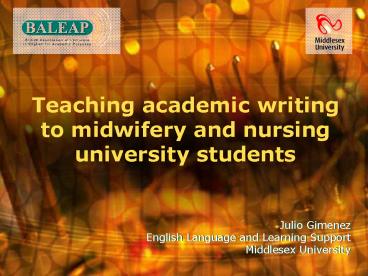Teaching academic writing to midwifery and nursing university students PowerPoint PPT Presentation
1 / 17
Title: Teaching academic writing to midwifery and nursing university students
1
Teaching academic writing to midwifery and
nursing university students
- Julio Gimenez
- English Language and Learning Support
- Middlesex University
2
Outline
- Theoretical background GAW, D-s AW
- The study
- A typology of genres in nursing midwifery
- Genre cognitive linguistic demands
- Students views
- Pedagogical implications
3
Background General Academic Writing (GAW) in HE
- A skill students need to master
- On admission, students expected to know the
basics (Elander et al., 2006 Lillis Turner,
2001 Whitehead, 2002) - Expected to write with precision and control over
rhetorical patterning (Lillis Turner, 2001) - The academic essay (default genre- Andrews,
2003 Womack, 1993) - One of the most demanding tasks and source of
frustration (Elander, et al. 2006 Krauser, 2001) - Its importance acknowledged by students even at
post-graduate levels (Allison, 2004)
4
Background Discipline-specific Academic Writing
(D-s AW) in HE
- Some of these beliefs also hold in nursing
midwifery Students will acquire it relatively
easily to the expected standards (Whitehead
2002) - However,
- Nursing and midwifery students find D-s AW
difficult (Gimenez, 2007) - They find most guidelines and requirements
confusing - Most writing lecturers focus on structuring
organisational principles (Kaldor Rochecouste,
2002) - Most content lecturers seem to take these as
given and to highlight the need for
discipline-specific thinking, argumentation, and
content (Bazerman, 2005 Gimenez, 2007 McLeod,
1989)
5
The study
- Aim To investigate the nature and dynamics of
academic writing in pre-registration nursing and
midwifery at a UK university - Duration Over two semesters in 2004 and in 2005
- Participants N 135 (68 nursing students, 67
midwifery students) - Data surveys, writing samples and criteria to
mark subject specific genres - Report
- Typology of discipline-specific genres
- Difficulties students find
- How students feel they can be best helped
6
A typology of genres in nursing midwifery
Level
General
Nursing
Midwifery
7
Genre cognitive demands
- Cognitive process(es) involved in writing the
specific genres (e.g. Reflection for the
reflective essay) - Appropriate model(s) for a given genre (e.g.
Gibbs reflective cycle or Johns guided
reflection) - Critical analysis, evaluation and critiquing
- Support claims with evidence (literature/clinical
experience) - Evaluation of source materials
- Link between theory and practice
8
Genre linguistic demands
- Links between assignment question and written
assignment (e.g. discuss This report will
discuss) QA - Explicit reference to processes and models used
in assignment - The language of critical analysis, evaluation,
critiquing - Appropriate devices to support claims (e.g. right
verb) and to show writers stance (e.g. Rogers
(2005, p. 234) strongly suggests that) - Projecting an impersonal voice
- Linking theory and practice (e.g. observed on
the writers clinical placement.)
9
Typical marking criteria
Reflective essay (Level 1)
10
Students views Frequent genres
11
Students views Frequent genres
12
Students views Difficult genres
13
Students views After writing
14
Students views Best helped
15
Pedagogical implications
In nursing and midwifery
16
References
- Allison, D. (2004) Creativity, students academic
writing, and EAP exploring comments on writing
in an English language degree programme. Journal
of English for Academic Purposes, Vol. 3191209. - Andrews, R. (2003). The end of the essay?
Teaching in Higher Education, Vol. 8/1117-128. - Bazerman, C. (2005). A response to Anthony
Fleurys Liberal Education and Communication
against the Disciplines A view from the world
of writing. Communication Education, Vol., 54/1
86-91. - Elander J., K. Harrington, L. Norton, H. Robinson
and P. Reddy (2006). Complex skills and academic
writing a review of evidence about the types of
learning required to meet core assessment
criteria. Assessment and Evaluation in Higher
Education, Vol. 31/1 7190 - Gimenez, J. (2007). Writing for Nursing and
Midwifery Students. Basingstoke Palgrave
Macmillan. http//www.palgrave.com/products/Catalo
gue.aspx?is0230008577
17
References
- Kaldor, S., Rochecouste, J. (2002). General
academic writing and discipline specific academic
writing. Australian Review of Applied
Linguistics, 25(2), 29-47. - Krause, K-L. (2001). The university essay writing
experience a pathway for academic integration
during transition. Higher Education Research
Development, Vol. 20/2 147-168. - Lea, M. and Street, B. (1998). Student writing in
higher education an academic literacies
approach, Studies in Higher Education,
11/3182199. - Lillis, T. and Turner, J. (2001) Student writing
in higher education contemporary confusion.
Teaching in Higher Education, Vol. 6/157-68. - McLeod, S. (1989). Writing across the curriculum
The second stage, and beyond. College Composition
and Communication, Vol. 40 337-343. - Whitehead, D. (2000). The academic writing
experiences of a group of student nurses A
phenomenological study. Journal of Advanced
Nursing, Vol. 38/5 498-506. - Womack, P. (1993). What are essays for? English
in Education, Vol. 27/242 48.

